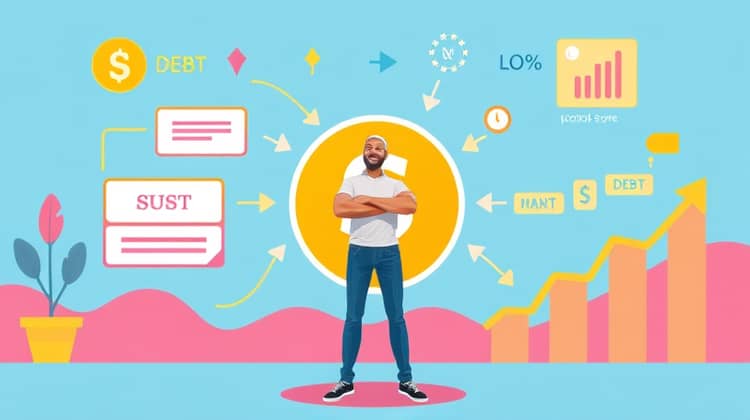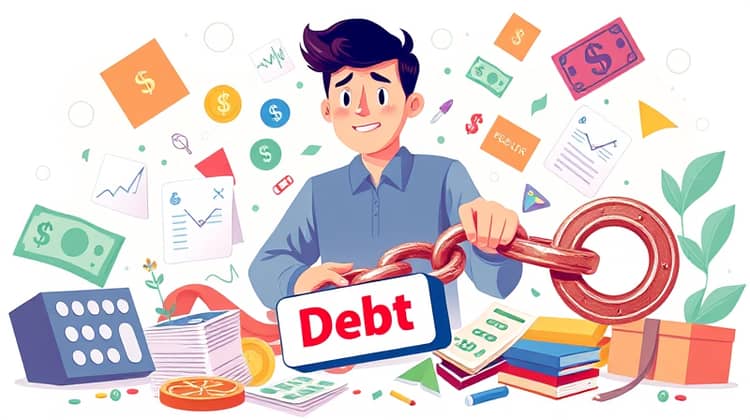Managing debt can be overwhelming, especially when you have multiple loans and credit card balances to juggle. Many individuals face challenges in maintaining their financial health, leading them to seek solutions that simplify their payments. One popular option is debt consolidation loans, which combine multiple debts into a single loan with a potentially lower interest rate.
But is a debt consolidation loan the right solution for everyone? In this article, we’ll explore the ins and outs of debt consolidation loans to help you make an informed decision. We’ll discuss what they are, their advantages and disadvantages, steps to obtain one, tips for success, and possible alternatives to consider.
Understanding Debt Consolidation Loans

Debt consolidation loans are financial products designed to help individuals consolidate multiple debts into one manageable loan. Typically, these loans are used to pay off high-interest credit cards, medical bills, or other personal loans. By combining multiple debts, borrowers can simplify their payments and potentially reduce their overall interest rate, making it easier to manage their finances.
To qualify for a debt consolidation loan, borrowers generally need a good credit score and a stable source of income. Lenders assess the borrower’s ability to repay the loan and may require collateral for secured loans. Understanding the terms and implications of debt consolidation is crucial before proceeding with this option.
- What is a debt consolidation loan?
- How does it work?
- Who is eligible?
- Types of debt consolidation loans.
In essence, a debt consolidation loan can be a useful tool for those looking to regain control over their finances. However, it is essential to fully comprehend its workings and evaluate personal circumstances before initiating the process.
The Pros of Debt Consolidation Loans

Debt consolidation loans come with several advantages that can assist individuals in managing their financial obligations more effectively.
- Simplifies payment process by combining multiple debts into one payment.
- Potentially lowers the interest rate, reducing overall debt cost.
- Can improve credit score by lowering credit utilization ratio.
- Provides a structured repayment plan with a fixed term.
These benefits can significantly enhance an individual's financial situation, making it easier to stay on top of monthly payments and reduce the burden of multiple creditors.
The Cons of Debt Consolidation Loans

While debt consolidation loans may sound ideal, they also come with some drawbacks that borrowers should carefully consider.
- Not all loans come with lower interest rates; borrowers may end up paying more in interest over time.
- Requires good credit for the best rates, making it unsuitable for those with poor credit histories.
- Can lead to increased debt if borrowers accumulate new debts while paying off the consolidated loan.
- Potential fees for taking out the loan, such as origination fees or prepayment penalties.
Understanding these disadvantages is vital as they can hinder the effectiveness of debt consolidation as a financial solution. Borrowers should evaluate both the pros and cons to determine if this option aligns with their long-term financial goals.
Ultimately, the decision to consolidate debt must be made with a thorough understanding of one's financial situation, ensuring that it leads to improved financial health rather than exacerbating existing problems.
How to Get a Debt Consolidation Loan

If you decide that a debt consolidation loan is suitable for you, the process of obtaining one typically involves several steps.
- Check your credit report and score to understand your financial standing.
- Research and compare different lenders and their loan offers.
- Gather necessary documents, such as income proof and existing debt information.
- Apply for the loan and wait for the lender's decision.
- If approved, use the loan to pay off existing debts immediately.
Following these steps can help streamline the process and increase the likelihood of securing a favorable loan. It's essential to remain organized and informed throughout the application process.
Tips for Successful Debt Consolidation

To maximize the benefits of debt consolidation, consider these essential tips.
- Create a budget to better manage your finances post-consolidation.
- Avoid accumulating new debt while paying off the consolidated loan.
- Make consistent monthly payments and avoid late fees.
- Communicate with your lender if you encounter any repayment difficulties.
Implementing these strategies can help ensure that your debt consolidation journey is effective and leads to long-term financial stability.
Alternatives to Debt Consolidation Loans

Debt consolidation loans are not the only option for managing debt. There are alternative methods that individuals might consider when looking to improve their financial situation.
For those who may not qualify for a debt consolidation loan or are looking for different solutions, exploring alternatives is crucial.
- Credit counseling services that provide guidance on debt management.
- Debt settlement, negotiating with creditors to reduce the amount owed.
- Bankruptcy as a last resort for severe financial distress.
- Balance transfer credit cards that offer lower interest rates for debt consolidation.
Each alternative comes with its own set of benefits and risks, making it vital for individuals to assess their specific circumstances before choosing a path. It’s advisable to seek professional financial advice when dealing with significant debt issues to find the most suitable solution.














